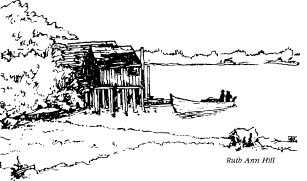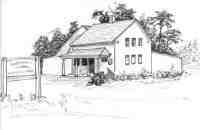Allen's Seafood
We interviewed Dain Allen to
learn about the kinds of fishing that he's done and
the business that he and his brother, Scott Roberts,
own.
Dain was born in Portland,
Maine and grew up in the white house on the corner
of Lookout Point Road where he lives now. Dain's
father was Henry Allen who started Allen's Seafood.
Besides owning the business, Henry went clamming and
smelting.
Dain has always gone fishing.
He was only five when he got his first skiff. The
first type of fishing that he did was clamming.
Allen's Seafood was started
with a stand that was on the main road across from
Dain Allen's home. The Allens didn't have a wharf at
that time, so the lobsters were kept in a lobster
car out in the water. The Allens caught most of
their own products back then. The wharf was built in
the 60's. Now Dain and his brother, Scott Roberts,
own the business. They buy from 21 boats and conduct
most of the business on their wharf. Besides men
that sell to them, they have 3 other men working on
the wharf.
Through the years Dain has
gone lobstering, scalloping, smelting, musseling,
oystering, shrimping, sea mossing, sea urchining and
tub trawling. He has tried most of the fishing
that's done in the area.
Mr. Allen explained the
different ways to get scallops and shrimp. He said
to get shrimp you use a trawl that is shaped like a
big funnel with two heavy doors on the side that
spread out. It's towed on the bottom of the ocean.
With scallops, you use a big steel dredge that is
also towed on the bottom. The dredge will pick up
scallops, rocks and a lot of other things. The
scallops are then picked out and the rest is thrown
back. The scallop season starts the first of
September and goes until April 15. Shrimp season
starts after the first of the year and ends at
different times, depending on how good the catch is.
Sometimes it can end as late as June.
Dain usually uses a bigger
boat for scalloping and shrimping than he does for
lobstering. He uses a 44 ft. boat for lobstering. He
said you don't have to carry as much equipment to go
lobstering as you do for scalloping and shrimping,
and a smaller boat will go faster.
Smelting used to be a big
business in this area, but because of regulations,
it's no longer a Harpswell industry. Dain and his
father used to go with a net called a sweep seine.
They went at nighttime. Later Dain rigged up a trawl
with a net that had smaller mesh. It caught a lot
more fish.
People get mussels by
dragging with a steel dredge. They get clams by
using a hoe and having to turn the mud over and pick
the clams out.
Divers get sea urchins. You
can also use a dredge and drag them. Sea urchins are
sold to a foreign market, mostly Japan. Japanese
people eat a lot of sea urchins. There are about two
dozen dealers on the coast that buy sea urchins and
ship them to Japan.
Pogies are menhaden. They are
used for fishmeal and bait. They are used for bait
in this area. You get them mostly with a purse
seine, but you can use a gill net or a sweep seine.
People that go tub trawling
use a long rope with a lot of hooks. The ropes go to
the bottom of the ocean. When the rope is hauled,
fish are on the hooks.
Sea moss was a big industry
in Harpswell in the fifties and sixties. Moss was
gathered in the spring. It made a good income for
fishermen who were getting gear ready for
lobstering. They weren't making as much money at
that time of year. Teenagers also earned money from
mossing. Moss was gathered by using a rake similar
to a garden rake. The rake had a basket on top of
it. As moss was raked from ledges it went into
baskets and was taken to Dain's wharf where it was
weighed and sold. When sea urchins came alone, moss
became scarce because urchins eat sea moss. There
are still one or two places buying moss in this
area. It's processed at Five Islands. Sea moss is
used for such things as chocolate milk, jello,
puddings, and ice cream. It keeps ingredients from
separating. Kraft Foods used to buy a lot of moss.
A lot of people in Harpswell
have gone tuna fishing. They catch them by hook or
harpoon. Dain uses a harpoon. The largest tuna he
has ever caught weighed 840 pounds. Sometimes tuna
has brought in a lot of money. Sometimes it has been
forty or fifty dollars per pound. If the tuna wasn't
of good quality they wouldn't get as much money. If
tuna is caught, fishermen call their local buyers.
They come and inspect the fish and then offer a
price. If the fishermen don't like the price, they
send it to Japan where they usually get a better
price.
There are many more people
fishing now than there used to be. In the bay near
Mr. Allen there used to be ten fishing boats. Now
there are hundreds. There are more rules and
regulations. Mr. Allen said, “Sometimes we don't
understand the new rules, but usually there's a
reason for them and they do help us.”
When we asked Dain why he
became a fisherman he said, “It was what my father
did and I never wanted to do anything else.
Sometimes it’s hard to accept new rules. When I've
worked at something all my life and someone comes
along that's never stepped aboard a boat and tells
me I've got to do it another way that's hard to
take.” Dain's favorite type of fishing is smelting.
Dain Allen also said, “I would never try to talk
someone else into being a fisherman, but I'd never
talk them out of it either.
|

